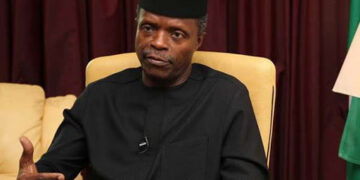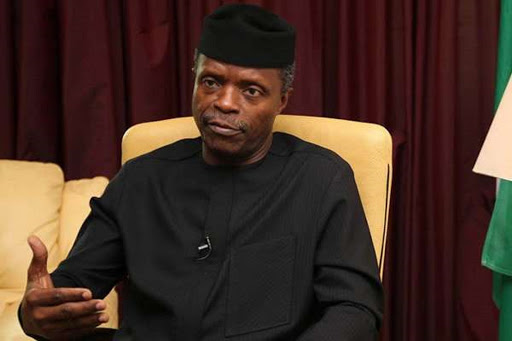By John Ikani
Vice President of Nigeria, Professor Yemi Osinbajo has urged creditors to consider forgiving debts in return for a commitment to using outstanding payments on programs to mitigate climate change in Africa.
Osinbajo made the proposition during a lecture on a just and equitable energy transition for Africa at the Center for Global Development in Washington D.C. on Thursday.
He said the swap deal, if approved, would significantly advance the course of global net-zero emissions targets and facilitate energy access and the development of African countries.
Spokesperson of the Vice President, Laolu Akande made these known in a statement titled, ‘In US Forum lecture, Osinbajo advocates Debt-for-Climate (DFC) swaps, greater participation in global carbon market for African nations’.
Explaining the DFC concept Osinbajo said, “debt for climate swaps is a type of debt swap where bilateral or multilateral debt is forgiven by creditors in exchange for a commitment by the debtor to use the outstanding debt service payments for national climate action programs.
“Typically, the creditor country or institution agrees to forgive part of a debt, if the debtor country would pay the avoided debt service payment in a local currency into an escrow or any other transparent fund and the funds must then be used for agreed climate projects in the debtor country.”
According to him, the debt for climate swap deal is a win-win for both creditor/developed nations and Africa.
Justifying the rationale behind such a debt swap deal, the vice president submitted that the commitment to it would “increase the fiscal space for climate-related investments and reduce the debt burden for participating developing countries.
“For the creditor, the swap can be made to count as a component of their Nationally Determined Contributions.”
He added that to make this efficient “there are of course significant policy actions necessary to make this acceptable and sustainable”.
Osinbajo also said that Africa will need a fourfold increase in investment to achieve the energy mix needed to limit global warming to 1.5 degrees Celsius.
The continent needs $40 billion a year — quadruple the amount that’s been invested since 2018 — to provide its citizens with access to clean energy sources, Osinbajo said.
He called for a reversal of the trend in which 15% of the world’s population in high-income countries receives 40% of global energy investments, and developing countries with 40% of the world’s population receive only 15%.
“If energy access issues are left unaddressed, we’ll continue to see growing energy demand being addressed with high-polluting and deforesting fuels such as diesel, kerosene and firewood,” Osinbajo said.




































